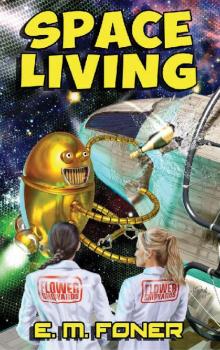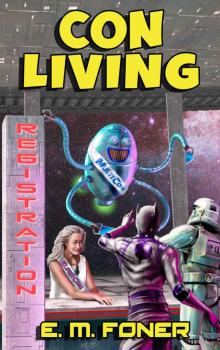- Home
- E. M. Foner
Turing Test
Turing Test Read online
Turing Test
Copyright 2018 by E. M. Foner
One
“That’s it for today,” I told the secretary. “I’m running late and I can’t babysit this thing. By tomorrow afternoon—Thursday at the latest—Windows should finish its update.”
“Will my laptop finally recognize its power adapter?” Amy asked.
“I can’t offer any guarantees. If your boss wants to save money, he should just buy you a new computer every time Microsoft releases a major upgrade. It would be cheaper than paying me to come out every time.”
“But then I wouldn’t get to see you, Mark. Unless you want to, you know, just meet somewhere? For a drink?”
Uh-oh. I’d been on Earth long enough to know a come-on when I heard one, and getting overly intimate with the natives has been the downfall of many an Observer. I immediately deployed my first line of defence.
“Sounds like fun, Amy, as long as you don’t mind my bringing homework along. I’m cramming for the exam, you know.”
“Another computer certification?”
“No, I’m taking the ‘enrolled agent’ test for the IRS,” I declared proudly, if untruthfully. “I’ve been moonlighting as a paid preparer for the last three tax seasons and I’m ready to take the next step. I just wish the federal government was hiring because I’d drop everything to become a real IRS agent.”
“You would?”
“I just love taxes, I can talk about them for hours. Have you ever heard of the sixty-five-day rule?”
“No,” she said, looking around the office for an excuse to break off the conversation, but most of the other employees had bolted within seconds of the clock striking five.
“You see, trusts have compressed tax brackets, and the trustees may have the option to distribute income—”
“Mrs. White,” Amy practically shouted, charging off in the direction of the startled office manager. “I’ll get the door for you.”
I finished gathering my tools, which consisted of a USB dongle, a multi-bit screwdriver, and my phone, all of which fit into my pockets. My business pays for an unlimited data package so I can use my phone as a hotspot while troubleshooting connectivity problems in small offices. The truth is, it would be easier for me to handle all that stuff over my internal infrastructure, but people on this planet look at you funny if you access their Internet without using any devices.
My last task onsite was to carefully adjust the ancient sheet of carbon paper in my retro invoice pad and make out a bill in duplicate, the top copy of which I left on the secretary’s desk. I’d be e-mailing an invoice as well, but I’ve found that making a paper record on the spot increases the odds of getting paid quickly. And to be honest, I just love using carbon paper. In my three years on Earth I have yet to see anything that comes close to it for elegant functionality or entertainment value.
My trusty Dodge minivan with its inventory of cables and swap-‘til-you-drop parts awaited me in the parking lot. I unlocked it from ten steps away and slipped in behind the steering wheel. Another day at the cover-job complete.
The phone in my pocket began to vibrate just as the minivan’s onboard system came alive and routed the call through the speakers.
“If It Breaks Service. Mark speaking.”
“It’s me,” a girl’s voice announced.
“Hey, eBeth. Is something wrong?”
“You’re out of Milk Bones.”
“There’s another box in the pantry,” I told her. “Don’t—” but she hung up before I could complete the thought.
Despite her diminutive size, eBeth wasn’t one for small talk, which is one of the reasons we get along so well. Most of my neighbors who need a favor feel they have to begin with a story about their hospitalized grandmother and work their way gradually into explaining how I would be saving countless lives if I could get their pirate satellite TV box working again. eBeth always says exactly what she means and lets the chips fall where they may. She’s also the only person in the building who Spot didn’t hate on sight.
Spot is my adopted canine, or maybe I’m his adopted off-worlder—it’s all a matter of perspective. The other day after retrieving his ball from under the couch, it occurred to me that the same is true for everything about our relationship. From my standpoint, it looks like I’m training him to present a paw on demand, to retrieve thrown objects, and to growl at people who want to waste my time. From Spot’s perspective, he’s taught me to give him treats whenever he offers a handshake, to extract his toys from tight places, and to keep walking when he doesn’t like the way somebody smells.
Technically, I’m not supposed to have a dog living with me, but in addition to adding color to my cover story he’s a dead ringer for the Archmage of Eniniac, a being so powerful that he can create false records in any information system regardless of the encryption level. Cross an Archmage and you’re likely to find that you have a century’s worth of unpaid parking tickets for an orbiting spaceship you never even owned.
But Spot was an Earth dog, not an Archmage, and dogs get lonely and bored when they’re left alone in an apartment for longer than they feel like sleeping. Before we ran into each other at the dumpster, Spot must have been a street dog, likely a cross between mutts who hadn’t had papers in the family going back twenty generations on each side. If you do the math, that’s a lot of mutts, but he was smart enough to know a good thing when I popped into town. Maybe the fact I’m not human is what drew him to me in the first place.
I had a deal with eBeth that in return for dropping by to keep Spot company and taking him out for a walk when he felt the urge, she could use my WiFi and a laptop I rebuilt after taking it in as a trade-up. So I didn’t feel bad about going straight from work to my real job at the mall on the state highway, just beyond the town line in a lower property tax jurisdiction.
Mark, I answered, silently this time as the call came over my private channel.
We use our code names even on secure channels? the newbie inquired.
Yes, Helen. Immersing yourself in character is the best way to avoid silly mistakes. Is there a problem?
I’m at the location but it looks abandoned.
It always looks abandoned on Tuesdays. Most of the remaining stores have gone to a five-day schedule, Wednesday through Sunday.
Weird. So I just park anywhere and go in?
Some of the others should have arrived by now, and if you leave your car in an isolated spot you’re just begging for somebody to break into it. Don’t forget to roll up the windows and lock it.
Why? It’s a community car.
It struck me that the newest member of my team had only arrived through the portal a few hours earlier and probably hadn’t had the time to get approved for any car-sharing services.
Uh, Helen?
Yes, Mark.
How did you obtain the car you’re driving?
I was getting acclimated to the planet and familiarizing myself with the downtown area like you suggested. I walked past a vehicle-sharing facility, so I borrowed one.
Could you describe this facility?
Sure. It was four stories high, with a ramp for an entrance, and I could see from the street that it was full of unused vehicles. I just kept trying the doors until I found one that wasn’t locked and had the keys in it. The nice man at the booth waved me through without paying, something about a monthly pass. Will they charge me when I bring it back?
Only with grand theft auto, I told her. Change of plans. Lock the keys in the car and I’ll call my police contact.
Oh. Sorry if I messed that up. But didn’t I see a unique identifying tag on the back of the vehicle when I got in? I’m sure I could access—
No, I cut her off. The first rule is to always stay in character. Just go in an
d meet the others, I’ll be there soon.
But I think I just found the right database and it’s not even encrypted. The security of computer systems on this world is even worse than you reported. I’ll just connect to the cellular network and—
Helen! I interrupted again, adding a stern harmonic to my transmission. Give me the license plate number and I will take care of the car. You will go inside and wait. Understood?
Yes, mission commander, she replied sulkily. Transmitting and out.
I had to brake hard to avoid a swerving car and I instantly noted that the driver was looking down and texting. Humans use the expression ‘Blowing up a phone,’ to describe when somebody keeps calling or sending text messages. I prefer my own version, taking advantage of the phone’s built-in backdoor and remotely reprogramming the device to substitute the Greek character set for texts. The last I saw of the teenager in my side-view mirror, he was shaking the phone upside down as if that would bring the English back.
When I finally pulled in next to Sue’s beat-up Corolla fifteen minutes late for my own meeting, I noted with satisfaction that a tow truck was already there loading the car Helen had inadvertently stolen. When I’d called my police contact, I explained that a friend had seen some kids in hoodies get out of the car and run off. In return, Lieutenant Harper made me promise that the police station would be my first stop in the morning, to deal with what he called, ‘A minor problem accessing our files.’ The police chief’s brother-in-law, Stanley, had the towing contract for the town, and he’d evidently rushed right over to be sure of his prize. But why was my newest team member chatting him up?
“Mark,” Helen called, waving wildly to get my attention. She was clearly taking her revenge over my insistence that she get into character as a human.
“Helen,” I greeted her, stretching my mouth into an artificial smile. “Why are you waiting in the parking lot?”
“Sue said we wouldn’t start cleaning until you got here and I wanted to see what would happen to the car. The man made the whole back of his truck tilt, like a ramp, but instead of driving the car up, he hooked the cables underneath somewhere and winched it up the incline. Then he pulled some levers and the whole thing, car and all, tilted back onto the truck. Look, he’s doing something under the trunk of it now.”
“He has to secure the vehicle so it doesn’t move around. We’re running late so let’s get inside.”
“Whatever,” she said, proving that at least she’d come equipped with the proper vocabulary for her role as a college girl. “See you around, Stanley.”
The driver shot me a guilty nod and then pretended to be fascinated by something under the back of the car. His wife worked as a police dispatcher and he knew that I saw her at the station on a regular basis.
Helen stayed a half-a-step ahead of me and led the way up the concrete walk between the snow-covered shrubs into the once-grand entrance of the mall. The music playing over the PA system had the strange effect of making the concourse seem even emptier than if it had been silent—something to do with the echoes, I suppose. Foot traffic was higher during the day with elderly mall-walkers escaping the cold, but most of them had night-vision problems so dusk was the cut-off. It was just after the holidays, and even when the stores were open, they got more returns than new business.
“You’re late again,” Sue observed as I followed Helen into the old Border’s Bookstore. The fake hardwood floor was almost completely covered with dozens of colorful rugs that were specially designed for easy cleanup of the various fluids and other substances that leaked out of young humans over the course of a day. I was initially skeptical of my second-in-command’s idea to open a daycare facility immediately after arriving on Earth, but I took care of creating the various certifications and licenses required. Her calculation that it would be the most efficient way to study pre-schoolers in their natural environment proved to be astute. The location also gave us an alternative place to hold our weekly meetings, though occasionally we would all be stuck waiting for a tardy parent to come and pick up their child.
“I was on a service call and Windows began updating,” I explained as we all moved into our starting positions. “You look exhausted.”
Sue grimaced at the code phrase as she always did, but the empty concourse of the mall seemed to flicker. I knew that anybody observing the storefront from the outside would now see the pre-recorded hologram of a cleaning team getting to work, while the irritating whine of a commercial vacuum cleaner would foil any potential eavesdroppers.
“He’s right,” Helen agreed, observing Sue closely. “Is there a problem with your mass-to-energy converter?”
“First of all, we don’t speak about mass-to-energy converters on this world, even when we’re among ourselves with active shielding,” I told the newbie sternly. “Second, she always looks tired by the end of the workday. It’s part of her cover.”
“Plus, I really am exhausted,” my second-in-command added. “Come and help me take care of little children all day and see how you feel. It’s physically and emotionally draining.”
“Sorry, my assignment is to observe college students,” Helen said hastily. “They told me that I’ll be the last addition to the team.”
“That’s right,” I confirmed, making it clear through my intonation that I was addressing the whole group. Communicating over audible frequencies by expelling air from the mouth and shaping it with teeth, tongue, and lips had become second nature with me, and I was proud of having mastered some of the nuances of public speaking. True, I had a transponder in my throat rather than vocal cords, but it was calibrated to produce the same vibrations as would be expected from a typical human my size. “We’re getting close to the finish line and a few more months should do it, so it’s time to start working on our final reports.”
“I finished mine already,” Paul said, looking up from the plastic abacus he had already spent three meetings trying to figure out, despite the fact I’d assured him that it was a non-functional children’s toy. Whether from conviction or sheer contrariness, he maintained that it was a mechanical calculator for computing sunspot cycles. “Humans aren’t going to change in the next few months, or the next few centuries for that matter.”
“Thus speaks our cynical automotive mechanic,” Sue said.
“I wish I was here to work with cars,” Helen put in. “From the little I’ve seen, they’re much more interesting than the humans.”
“Fixing automobiles isn’t the purpose of Paul’s assignment,” I reminded her. “His job is to assess how humans relate to their vital technology and how well they understand the machines to which they entrust their lives.”
“Which is not at all,” Paul grumbled. “I could sell most of them muffler bearings and the only thing they’d argue over is the price.”
“How about you, Mark?” Helen asked. “What’s your assignment?”
“I’m evaluating how humans use what passes as computer technology on this world.”
“And how they relate to artificial intelligence?”
“This room contains the only artificial intelligence on the planet.”
“I work in elder care,” Justin volunteered, stepping forward and giving the newbie a firm handshake. “Most of the old humans are pretty nice, though they have a lot of trouble with their memory subsystems.”
“Stacey von Hoffman, the Third,” our cultural expert introduced herself. “People in the art world don’t take you seriously unless you sound like you come from old money. Welcome to Earth.”
“Thank you,” Helen replied politely, though her attention had strayed to the final member of my team, who had busied herself wiping down toys with a cleaning solution of her own making.
“That’s Kim,” Sue told the newcomer. “She works at the town health department and she’s here on Earth to investigate human hygiene.”
“Did I miss something?” Kim asked, looking up.
“Now that the introductions are out of the way, you all k
now what comes next,” I said. “Who wants to start us off?”
“Do we really have to?” Sue complained. “Teddy White was sick when his mother dropped him off and I had to hold him all day to keep him from crying.”
“We have rules for a reason,” I told her. “Let’s go around in a circle and everybody take one.”
“Rule #1. No adoption of native pets,” my second-in-command recited unenthusiastically.
“Rule #2,” Paul said. “No revealing our presence to natives or unaffiliated extra-terrestrials.”
“Rule #3,” Justin continued the chain. “No interfering in native customs, however uncivilized they may be.”
“Without the commentary, Justin,” I said.
“Rule #4,” Kim said. “No employing our superior technology and intellect in a way that would risk exposing this mission.”
My turn had come, and I added, “Rule #5. No recruiting locals for off-planet work until the close of the review period.”
“Rule #6,” Stacey said. “No looting of cultural artifacts or violating local laws, unless absolutely necessary.”
I turned to the newbie. “Care to bring us home, Helen?”
She puzzled for a moment over the expression, and then added in a firm voice, “Rule #7. No going native.”
“Great. Now who has news to share? Kim?”
“I’ve collated all of the data on bacteria I’ve gathered from local restaurant kitchens and my conclusion is that the signs in bathrooms instructing employees to wash their hands aren’t as effective as you would think.”
“That’s because humans are functionally illiterate,” Paul grunted without looking up. “Let’s play cards.”
“We play games at team meetings?” Helen asked.

 Last Night on Union Station (EarthCent Ambassador Book 16)
Last Night on Union Station (EarthCent Ambassador Book 16) Empire Night on Union Station (EarthCent Ambassador Book 18)
Empire Night on Union Station (EarthCent Ambassador Book 18) Space Living (EarthCent Universe Book 4)
Space Living (EarthCent Universe Book 4) Review Night on Union Station (EarthCent Ambassador Book 11)
Review Night on Union Station (EarthCent Ambassador Book 11) Assisted Living
Assisted Living Con Living
Con Living Freelance On The Galactic Tunnel Network
Freelance On The Galactic Tunnel Network Career Night on Union Station
Career Night on Union Station Career Night on Union Station (EarthCent Ambassador Book 15)
Career Night on Union Station (EarthCent Ambassador Book 15) Word Night on Union Station (EarthCent Ambassador Book 9)
Word Night on Union Station (EarthCent Ambassador Book 9) Soup Night on Union Station
Soup Night on Union Station Human Test
Human Test Spy Night on Union Station (EarthCent Ambassador Book 4)
Spy Night on Union Station (EarthCent Ambassador Book 4) Family Night on Union Station (EarthCent Ambassador Book 12)
Family Night on Union Station (EarthCent Ambassador Book 12) Party Night on Union Station (EarthCent Ambassador Book 10)
Party Night on Union Station (EarthCent Ambassador Book 10) Turing Test
Turing Test Alien Night on Union Station (EarthCent Ambassador Book 2)
Alien Night on Union Station (EarthCent Ambassador Book 2) Wanderers On Union Station (EarthCent Ambassador Book 6)
Wanderers On Union Station (EarthCent Ambassador Book 6) Vacation on Union Station (EarthCent Ambassador Book 7)
Vacation on Union Station (EarthCent Ambassador Book 7) Book Night on Union Station (EarthCent Ambassasor 13)
Book Night on Union Station (EarthCent Ambassasor 13) LARP Night on Union Station
LARP Night on Union Station Carnival On Union Station (EarthCent Ambassador Book 5)
Carnival On Union Station (EarthCent Ambassador Book 5) LARP Night on Union Station (EarthCent Ambassador Book 14)
LARP Night on Union Station (EarthCent Ambassador Book 14) Book Night on Union Station
Book Night on Union Station High Priest on Union Station (EarthCent Ambassador Book 3)
High Priest on Union Station (EarthCent Ambassador Book 3) Meghan's Dragon
Meghan's Dragon Human Test (AI Diaries Book 2)
Human Test (AI Diaries Book 2) Guest Night on Union Station
Guest Night on Union Station Date Night on Union Station
Date Night on Union Station